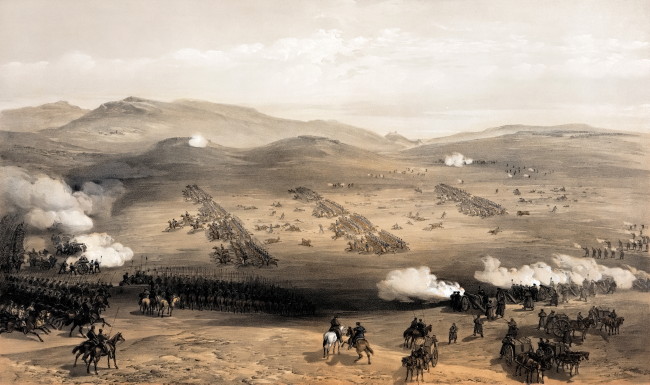Crimean War
Crimean War (1853-6) [Кримська війна; Krymska viina]. War between Turkey and its allies—Britain, France, and Sardinia-Piedmont—against Russia, which was attempting to extend its empire and influence in the Near East and to destroy the Ottoman Empire. In particular, Russia asserted its protectorate over the Danubian principalities of Moldavia, Wallachia, Bulgaria, and Serbia and reserved the right to occupy Istanbul and the Black Sea straits. In June 1853 Russia occupied Moldavia and Wallachia. In October fighting broke out in Transcaucasia, and on 30 November the Turkish fleet suffered a defeat at Sinop. In January 1854 British and French fleets entered the Black Sea. When Russian troops crossed the Danube River in the spring, the allies declared war. They were supported politically by other European countries. This forced the Russian army to retreat beyond the Prut River. The allies blockaded the Russian ports and in September disembarked in the Crimea, where they defeated the Russian army at Balaklava (25 October) and Inkerman (5 November). The danger that Bessarabia and southern, and even Right-Bank Ukraine might be occupied, as well as the loss of Sevastopol on 2 September 1855, greatly alarmed Russian government circles.
The war did much damage to Ukraine's economy, for Ukraine served not only as a close rear but also in part as the theater of action. The consequent opposition to the war among Ukrainian landowners and commercial circles and growing peasant unrest, particularly the movement known as the Kyiv Cossacks in 1855, assumed dangerous proportions. The Russian government became particularly fearful of Ukrainian aspirations to freedom, which found support in the West as shown by the Prussian plans to dismember the Russian Empire (the Wochenblatt party of Bethmann-Hollweg; memorandum from the Prussian ambassador to London, C. von Bunsen, to King Friedrich Wilhelm IV in 1854), as well as by the sentiments prevailing at that time in Britain, in France (C. Barrault-Roullon's comments on the danger of Russian expansionism and his hopes for a new Ivan Mazepa in Ukraine supported by Europe; Prosper Mérimée's Les cosaques de l'Ukraine et leurs derniers atamans), and in Polish émigré circles (Prince Adam Jerzy Czartoryski's plans and Michał Czajkowski's [Sadyk-Pasha's] projects).
After Austria threatened to join the allies, Russia was compelled to sign the Paris Peace Treaty on 30 March 1856 and to surrender southern Bessarabia and the mouth of the Danube River, as well as the right to keep a navy on the Black Sea.
The military and moral defeat suffered by Russia and the revolutionary events in Ukraine had a direct bearing on the abolition of serfdom in 1861 and the emergence of a Ukrainian political movement for emancipation.
BIBLIOGRAPHY
Eisenmann, L. ‘Neznámý dokument o Ukrajině roku 1855,’ in Sborník J. Bidlovi (Prague 1928)
Hurzhii, I. Borot'ba selian i robitnykiv Ukraïny proty feodal'no- kriposnyts'koho hnitu (z 80-kh rokiv XVIII st. do 1861 r.) (Kyiv 1958)
Curtiss, J.S. Russia's Crimean War (Durham, NC 1979)
Lubomyr Wynar
[This article originally appeared in the Encyclopedia of Ukraine, vol. 1 (1984).]

